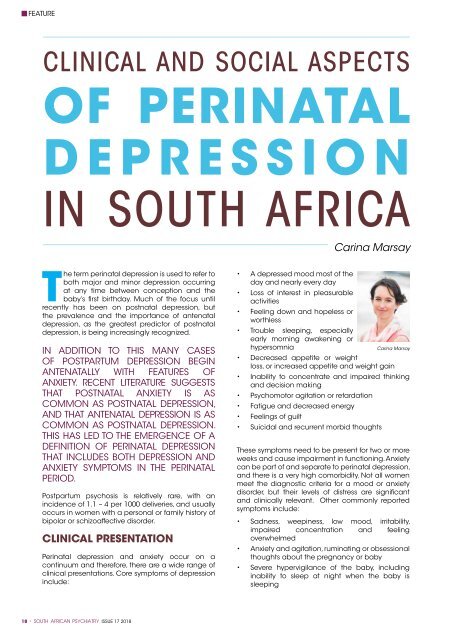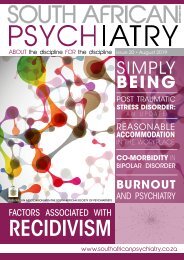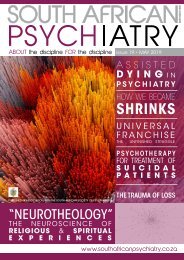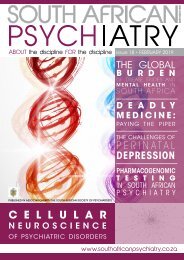South African Psychiatry - November 2018
South African Psychiatry - November 2018
South African Psychiatry - November 2018
Create successful ePaper yourself
Turn your PDF publications into a flip-book with our unique Google optimized e-Paper software.
FEATURE<br />
CLINICAL AND SOCIAL ASPECTS<br />
OF PERINATAL<br />
DEPRESSION<br />
IN SOUTH AFRICA<br />
Carina Marsay<br />
The term perinatal depression is used to refer to<br />
both major and minor depression occurring<br />
at any time between conception and the<br />
baby’s first birthday. Much of the focus until<br />
recently has been on postnatal depression, but<br />
the prevalence and the importance of antenatal<br />
depression, as the greatest predictor of postnatal<br />
depression, is being increasingly recognized.<br />
IN ADDITION TO THIS MANY CASES<br />
OF POSTPARTUM DEPRESSION BEGIN<br />
ANTENATALLY WITH FEATURES OF<br />
ANXIETY. RECENT LITERATURE SUGGESTS<br />
THAT POSTNATAL ANXIETY IS AS<br />
COMMON AS POSTNATAL DEPRESSION,<br />
AND THAT ANTENATAL DEPRESSION IS AS<br />
COMMON AS POSTNATAL DEPRESSION.<br />
THIS HAS LED TO THE EMERGENCE OF A<br />
DEFINITION OF PERINATAL DEPRESSION<br />
THAT INCLUDES BOTH DEPRESSION AND<br />
ANXIETY SYMPTOMS IN THE PERINATAL<br />
PERIOD.<br />
Postpartum psychosis is relatively rare, with an<br />
incidence of 1.1 – 4 per 1000 deliveries, and usually<br />
occurs in women with a personal or family history of<br />
bipolar or schizoaffective disorder.<br />
CLINICAL PRESENTATION<br />
Perinatal depression and anxiety occur on a<br />
continuum and therefore, there are a wide range of<br />
clinical presentations. Core symptoms of depression<br />
include:<br />
• A depressed mood most of the<br />
day and nearly every day<br />
• Loss of interest in pleasurable<br />
activities<br />
• Feeling down and hopeless or<br />
worthless<br />
• Trouble sleeping, especially<br />
early morning awakening or<br />
hypersomnia<br />
• Decreased appetite or weight<br />
loss, or increased appetite and weight gain<br />
• Inability to concentrate and impaired thinking<br />
and decision making<br />
• Psychomotor agitation or retardation<br />
• Fatigue and decreased energy<br />
• Feelings of guilt<br />
• Suicidal and recurrent morbid thoughts<br />
Carina Marsay<br />
These symptoms need to be present for two or more<br />
weeks and cause impairment in functioning. Anxiety<br />
can be part of and separate to perinatal depression,<br />
and there is a very high comorbidity. Not all women<br />
meet the diagnostic criteria for a mood or anxiety<br />
disorder, but their levels of distress are significant<br />
and clinically relevant. Other commonly reported<br />
symptoms include:<br />
• Sadness, weepiness, low mood, irritability,<br />
impaired concentration and feeling<br />
overwhelmed<br />
• Anxiety and agitation, ruminating or obsessional<br />
thoughts about the pregnancy or baby<br />
• Severe hypervigilance of the baby, including<br />
inability to sleep at night when the baby is<br />
sleeping<br />
18 * SOUTH AFRICAN PSYCHIATRY ISSUE 17 <strong>2018</strong>

















